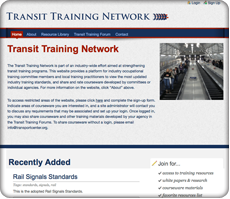News and Updates
Center works with Brotherhood of Railroad Signalmen to Strengthen Signal Maintainer Training
Posted October 2013
Center staff met with the Brotherhood of Railroad Signalmen’s (BRS) training committee October 18, 2013 to discuss future collaboration on training programs. The BRS’s Vice President Floyd Mason invited the Center to the meeting to strategize plans to upgrade training at railroad properties where there is very little or no current training.
Read more...Building a National System for Transit Maintenance Instructor Development
Posted October 2013
Preparing and qualifying technical instructors in transit is crucial for elevating the quality of training for bus and rail vehicle mechanics. At the Workforce Development Subcommittee meeting held at the recent 2013 APTA Annual Meeting there was strong interest in the possibility of upgrading the capabilities of these technical trainers.
Read more...Building a National System for Transit Maintenance Instructor Development
Posted October 2013
Preparing and qualifying technical instructors in transit is crucial for elevating the quality of training for bus and rail vehicle mechanics. At the Workforce Development Subcommittee meeting held at the recent 2013 APTA Annual Meeting there was strong interest in the possibility of upgrading the capabilities of these technical trainers.
Read more...Weekly Update for October 10, 2013
Posted October 2013
This week’s update includes stories on APTA’s Annual Meeting, how a thriving nightlife needs public transportation, industry leaders discuss progress with positive train control and why DC Metro eliminating eight-car trains during government shutdown.
Read more...The Center’s Executive Director Highlights Frontline Workforce Training Needs at APTA Annual Meeting
Posted October 2013
The enormous challenge of training transit’s frontline workforce was laid out to participants in APTA’s Annual Meeting this week in Chicago. Over the next decade the transit industry will need to hire and train workers equivalent to 88 percent of everyone working in the industry today. The industry needs greater investment in human capital - frontline workforce skills.
Read more...Join Our Mailing List
Keep up with updated industry training standards, share and rate courseware in bus, rail and elevator/escalator maintenance.
